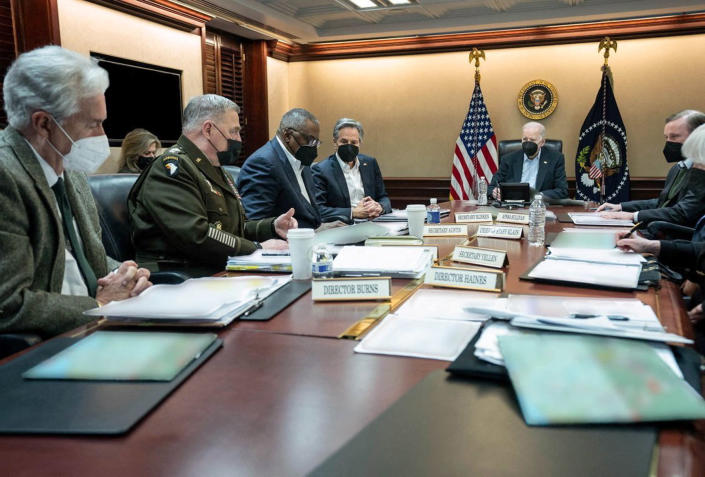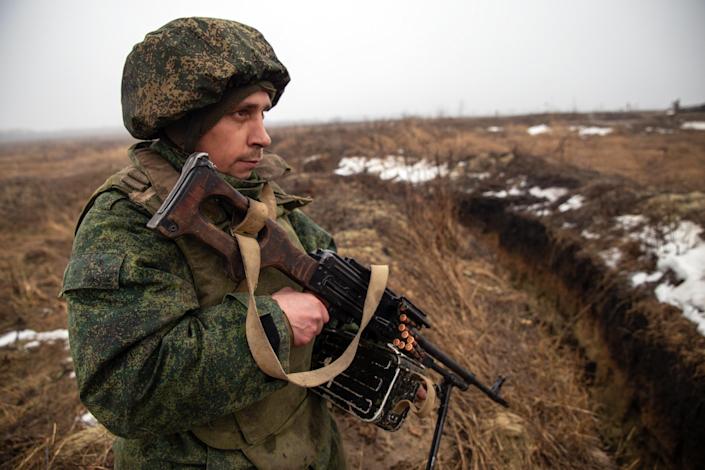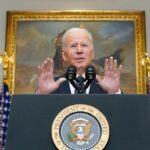Russian President Vladimir Putin on Monday formally recognized the independence of two Moscow-backed breakaway regions in eastern Ukraine where Russia has been supporting armed separatists in an eight-year conflict.
The move by Putin was seen by the United States and its European allies as a dramatic provocation and possibly part of a pretext to invade Ukraine. The U.S. and European Union both swiftly announced sanctions.
Many experts believe that Moscow’s formal recognition will effectively scuttle a previous ceasefire agreement that some Western allies hoped could provide a route out of the crisis.
In a wide-ranging televised speech Monday evening, Putin described Ukraine as a historical part of Russia that was illegitimately taken from Moscow and is now run by a “puppet regime” controlled by the U.S. and the West.
“Ukraine is not just a neighboring country, they are a part of our culture,” he said.
Noting how Ukraine has taken down some of its Soviet-era statues, he warned Kyiv, “You want decommunization? We will show you what it’s like. “
He then signed a decree formally recognizing the self-proclaimed Donetsk People’s Republic and Luhansk People’s Republic, which have been controlled by Russian-backed separatists since 2014.
Alongside him were Denis Pushilin and Leonid Pasechnik, heads of the Donetsk and Luhansk republics.


Soon after Putin’s address wrapped, Ukrainian President Volodymyr Zelenskyy announced he spoke with President Joe Biden Monday afternoon and would soon speak with British Prime Minister Boris Johnson. A White House official said the call lasted about 35 minutes.
White House press secretary Jen Psaki said the White Biden will soon sign an executive order prohibiting U.S. investment and trade in the Ukrainian breakaway regions. That order will additionally allow the administration to sanction any person who operates in those area.
“We have anticipated a move like this from Russia and are ready to respond immediately,” she said in a statement. “To be clear: these measures are separate from and would be in addition to the swift and severe economic measures we have been preparing in coordination with Allies and partners should Russia further invade Ukraine.”
The European Union condemned “in the strongest possible terms” to Putin’s recognition of the two regions in eastern Ukraine.
“This step is a blatant violation of international law as well as of the Minsk agreements,” European Commission President Ursula von der Leyen and European Council President Charles Michel said in a joint statement. “The Union will react with sanctions against those involved in this illegal act.”
Additionally, the U.S. congressional delegation to the Munich Security Conference pledged to “work toward” emergency legislation that “will best support our NATO allies and the people of Ukraine, and support freedom and safety around the world.”
“No matter what happens in the coming days, we must assure that the dictator Putin and his corrupt oligarchs pay a devastating price for their decisions,” the bipartisan group led by Sens. Lindsey Graham, R-S.C., and Sheldon Whitehouse, D-R.I., wrote.
Over the past week, the Russian parliament and top officials have asked Putin to formally recognize the Ukrainian regions. Earlier Monday, the Moscow-backed leaders of the two breakaway regions had formally asked Putin to do the same.
Last week, separatist leaders called for evacuations of civilians to Russia, warning of an imminent Ukrainian offensive. Ukraine has repeatedly denied any plans to carry out attacks on the region, saying it wants a resolution by diplomatic means.
More than 60,000 evacuees have arrived in Russia as of Monday, according to Russian emergency ministry officials.
Meanwhile, Biden administration officials have discussed plans with the Ukrainian government for Zelenskyy to leave Kyiv in the event of a Russian invasion, according to two people familiar with the discussions.
Under a plan that’s been discussed, Zelenskyy would relocate to Lviv in western Ukraine, about 50 miles from the Polish border, the people familiar with the discussions said.
Putin-Biden summit?
Meanwhile, in a series of phone calls that dragged late into the night Sunday, French President Emmanuel Macron tried to broker a meeting between the American and Russian presidents in a bid to avert Europe’s gravest crisis since the Cold War.
Biden accepted a meeting with Putin “in principle” if Russia doesn’t invade Ukraine first, according to the White House. The Kremlin said there were “no concrete plans” for a summit, but it had not ruled one out.
On Sunday, a U.S. official and another person with knowledge of the matter said the U.S. had obtained intelligence showing that Russian military officials were given an order to go ahead with an invasion.
The intelligence, which was developed very recently, informed Biden’s startling declaration Friday that the U.S. believes Putin has already decided to invade, they said.
On Monday, Russian Foreign Minister Sergey Lavrov said he would meet Secretary of State Antony Blinken on Thursday in Geneva — a possible precursor to a Biden-Putin summit. Blinken has earlier said the meeting would be off if Russia invades Ukraine.
Russia has been amassing tens of thousands of troops near Ukraine’s borders in recent weeks, prompting fears of an invasion that it firmly denies it is planning.


Moscow has extended massive military drills with its close ally Belarus, to Ukraine’s north. The drills were meant to wrap up Sunday, adding to the tensions and speculation that Russia could use the military buildup there to attack Ukraine from the north.
The renewed flurry of diplomacy comes amid increased shelling in Ukraine, where independent monitors over the weekend reported a markedly rise in the number of cease-fire violations.
The U.S. and its allies have accused Russia of planning to stage “false flag” operations in the region that could be used as an excuse for an incursion.
Since the shelling in the region began escalating Thursday, the Ukrainian forces and separatists have traded blame and accused each other of provocations. Ukraine’s military said two Ukrainian soldiers had been killed in the increased violence over the weekend, and the separatist forces reported two civilian deaths Sunday.
On Monday, both Ukrainian forces and separatists reported continued shelling of residential settlements.
Ukraine said late Sunday the separatist forces fired on rebel-controlled Luhansk in a provocation aimed at laying blame on the Ukrainian forces.
Meanwhile, Russia’s FSB security service said on Monday a shell from Ukrainian territory had completely destroyed a border guard post in Russia’s Rostov region but had caused no casualties, the state-run Interfax news agency reported. The incident occurred around 500 feet from the border between Russia and Ukraine, Interfax cited the FSB as saying.
Ukrainian Defense Minister Oleksii Reznikov told reporters that Ukraine had “nothing to do” with the attack. In a separate statement, Ukraine’s border service called FSB’s claims “an outright provocation.”
Separately, Moscow said Monday that Ukrainian military saboteurs had tried to enter Russian territory, leading to five deaths — an accusation Kyiv has dismissed.
Fears of a Russian invasion have caused collateral damage for the Ukrainian economy, but on Monday, Russia’s markets also showed signs of nervousness.
The ruble slid to a more than three-week low, and Russian stocks plunged, Reuters reported.




